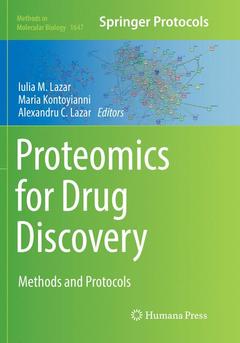Description
Proteomics for Drug Discovery, Softcover reprint of the original 1st ed. 2017
Methods and Protocols
Methods in Molecular Biology Series, Vol. 1647
Coordinators: Lazar Iulia M., Kontoyianni Maria, Lazar Alexandru C.
Language: English
Subjects for Proteomics for Drug Discovery:
Support: Print on demand
302 p. · 17.8x25.4 cm · Hardback
Description
/li>Contents
/li>Comment
/li>
A Photoaffinity Labeling-Based Chemoproteomics Strategy for Unbiased Target Deconvolution of Small Molecule Drug Candidates.- Multiplexed Liquid Chromatography-Multiple Reaction Monitoring Mass Spectrometry Quantification of Cancer Signaling Proteins.- Monitoring Dynamic Changes of the Cell Surface Glycoproteome by Quantitative Proteomics.- High Resolution Parallel Reaction Monitoring with Electron Transfer Dissociation for Middle-Down Proteomics: An Application to Study the Quantitative Changes Induced by Histone Modifying Enzyme Inhibitors and Activators.- Preparation and Immunoaffinity Depletion of Fresh Frozen Tissue Homogenates for Mass Spectrometry-Based Proteomics in the Context ofDrug Target/Biomarker Discovery.- Target Identification Using Cell Permeable and Cleavable Chloroalkane Derivatized Small Molecules.- Microfluidics-Mass Spectrometry of Protein-Carbohydrate Interactions: Applications to Development of Therapeutics and Biomarker Discovery.- Studying Protein-Protein Interactions by Biotin AP-Tagged Pulldown and LTQ-Orbitrap Mass Spectrometry.- Post-Translational Modification Profiling-Functional Proteomics for the Analysis of Immune Regulation.- Reverse Phase Protein Arrays and Drug Discovery.- Probing Protein Kinase-ATP Interactions Using a Fluorescent ATP Analog.- Preparation of Disease-Related Protein Assemblies for Single Particle Electron Microscopy.- Identification of Lipid-Binding Modulators Using the Protein-Lipid Overlay Assay.- Resazurin Live Cell Assay: Setup and Fine-Tuning for Reliable Cytotoxicity.- Exploring Protein-Protein Interactions as Drug Targets for Anti-Cancer Therapy with In Silico Workflows.- Method to Identify Silent Codon Mutations that May Alter Peptide Elongation Kinetics and Co-Translational Protein Folding.- In Silico Design of Anticancer Peptides.- Docking and Virtual Screening in Drug Discovery.- Bioinformatics Resources for Interpreting Proteomics Mass Spectrometry Data.

